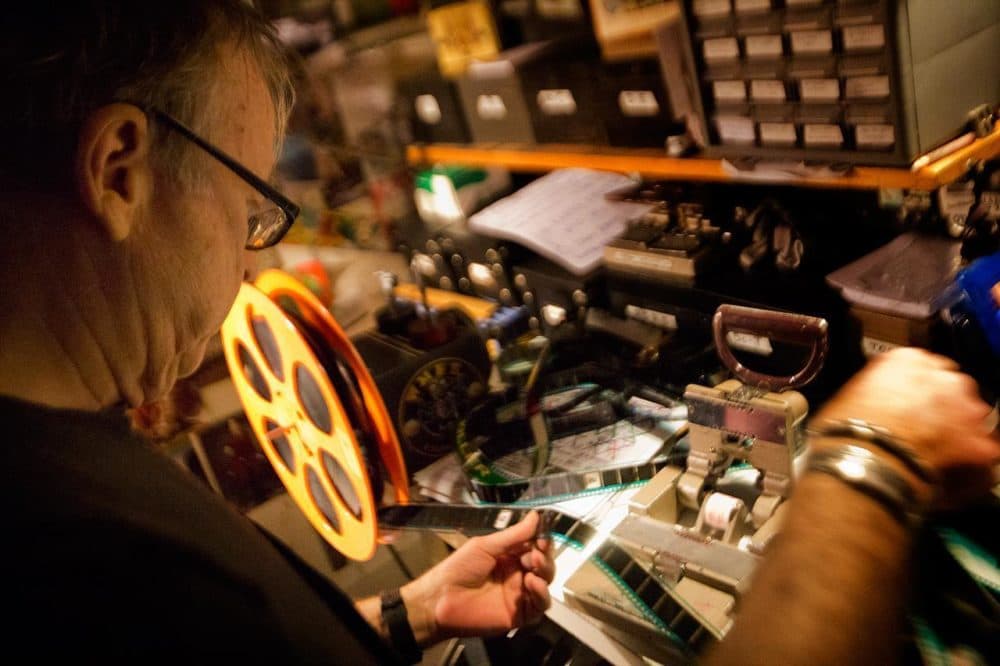Advertisement
Update: That's NOT All Folks! Brattle Reaches Its Goal For Going Digital
Updated at 3:45 p.m.
The Brattle Theatre announced that it has reached its goal, via Kickstarter, to raise enough funds for converting to digital projectors. (The theater, however, is still looking for additional funds on the site.)
___
CAMBRIDGE, Mass. — Whether you realize it or not, the way movies get to your local theater has undergone a revolution in the past five years. By the fall, film studios say they’ll do away with traditional print films all together.
Movie houses must now use digital projectors to screen films they download. For small specialty theaters in New England, like Cambridge’s Brattle Theatre, it’s a bittersweet transition.
The 18th annual Bugs Bunny festival is on this week at the Brattle. Fred Hanle is one of the projectionist who makes the magic happen. He threads a two-foot diameter reel of celluloid film into the Brattle’s 60-year-old, rear-screen projector. It’s believed to be the only one still in commercial use in the U.S.
"I make a loop here with two fingers to get the right size ... and close that. Then I have to set this one so it lines up over there," Hanle says. "And I have done this actual maneuver here, this and changeover, I’ve done this 60,000, 70,000 times in my life probably.”

But Hanle’s going to need some new, digital-era tricks. By September, big industry players like Fox and Sony will stop printing new movies on film altogether. That will complete a switchover to digital that started about five years ago. With each print costing thousands of dollars — not to mention storage and transport expenses — the studios will save millions.
So if the nonprofit Brattle can raise the funds, its old projector, with its sprockets and gears and reels, will soon be joined by a brand new, software-driven digital projector.
“When you think about the fact that movies have been projected on film for 100 years, it seems sad to think that the technology is changing,” says Ivy Moylan, the Brattle’s executive director.
The theater will still use the old projector, Moylan says, for archival warhorses like "Casablanca." And it will be able to screen the latest digital indie releases, too. But Moylan’s having trouble embracing the change.
“Film works. It plays,” she says. “If a film breaks, the entire print isn’t destroyed. We have a projectionist who can go and tape back together the film with basic tape and put it back together again and it runs through the projector again. It is a stable, stable medium.”
And on top of the practical issues, there’s the aesthetics.
“There’s just too much information in the [digital] image. The depth of field is confusing in that you can see forever and our eyes don’t see like that,” Moylan says. “So it’s not presenting the world to us the way that we see it; it’s presenting the world to us the way a computer sees it.”
Many aficionados feel the same way. Among them, Mitchell Shakour, owner of a drive-in in the western Massachusetts town of Northfield.
“When you think about the fact that movies have been projected on film for 100 years, it seems sad to think that the technology is changing.”
Ivy Moylan, executive director of the Brattle Theatre
“I’m a purist, so I believe the film quality is better,” he says. “There’s a certain life-like quality to it. The digital is almost surreal, almost cartoonish.”
Shakour followed his father into the business, and while over the years other drive-ins in the area have closed, he’s kept the summer-time tradition going.
“We’ve got a good picture on the screen and people like the nostalgia of poking in the booth and seeing something that’s basically the same thing Edison invented,” he says. “You know it’s a real fire in there, not a bulb. It’s arc and carbon creating a fire just like a welder’s lamp.”
But after this summer, the fire will go out. To stay in business Shakour says he’ll have to come up with as much as $200,000 dollars to go digital. The same goes for most of the small theaters in Massachusetts that haven’t yet made the jump.
Brattle Theatre projectionist Fred Hanle says he’s not exactly nervous about the change, just curious.
“Well I’m going to find out if I’ll miss [working only with traditional film],” he says. “You know, it’s more work doing this and I am assuming the digital will be less work and I should be happy about that. But that’s not always the end-all to everything, how much work is involved.”
He gives a good-luck jab at a bobble-head doll sitting on a shelf just before rolling the next set of shorts featuring Bugs, Sylvester and the gang.
“Always hit the Mexican wrestler before each show,” he says. “Lights down, great.”
The reels spin, the film spools through the projector and the familiar Looney Tunes fill the theater, where a handful of 21st century youngsters laugh at the 20th century shenanigans.
They at least don’t seem too concerned about just how the fun will be delivered in the future.
This program aired on February 22, 2013. The audio for this program is not available.